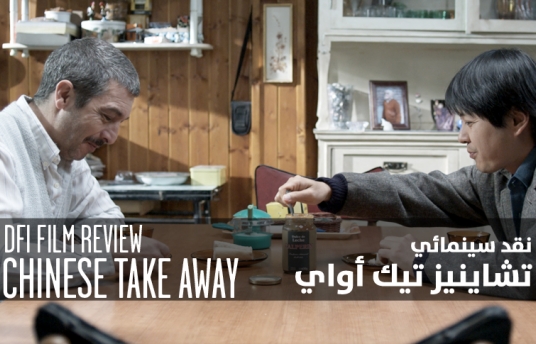DFI Film Review: Chinese Take-Away (2011)
Nov 27, 2011

Written by Reem Saleh, New Media, DFI
Film: Un Cuento Chino (Chinese Take-Away)
Year: 2011
Director: Sebastián Borensztein
Stars: Ricardo Darín, Muriel Santa Ana and Ignacio Huang
Genre: Comedy
“Chinese Take-Away” follows the journey of a total stranger who lands in Argentina and accidently finds himself living with a solitary middle-aged man. Needless to say, one major obstacle is a language barrier.
Grumpy Roberto (Ricardo Darin) finds a disoriented young Jun (Ignacio Huang), who has come from China, roaming the streets to find his uncle. In a rare charitable moment, Roberto decides to give this fumbling foreigner a lift. But Jun’s uncle has already moved from the given address, and the newcomer can’t make his way through the city. Roberto offers him to stay over for the night.
The two characters, opposites in their lifestyles, now live under the same roof. Roberto runs a hardware store and spends his time counting screws and screaming at the suppliers. His dull routine includes buying glass animals on a yearly basis as a memorial gift to his dead mother and collecting newspaper clippings of bizarre stories.
In contrast, Jun’s lively nature and handy services in the house compensate for him being utterly lost in translation with this stubborn old man. Even though his speech is incomprehensible to non-Chinese speaking audiences, he gains our heartfelt sympathy.
The setting-up of the two protagonists with starkly different personalities tells us more about Roberto than Jun. During the story which shows the pair, at least in parts, aiming for a common solution, we learn he’s been roaming around with a mask of hostility refusing people and emotions outside of his glasshouse but as fragile as the miniatures he collects. Even his former love Mari (Muriel Santa Ana) was something of a lost cause, trying and failing to get him back.
The narrative gets more engaging as the content of Roberto’s carefully collected newspaper cuttings is revealed. The film bounces between two realities: the new friendship in development and the news articles which come to life with Roberto’s imagination. We laugh at the irony of their situations – at one point there are cows falling from the sky on a woman about to receive her engagement ring.
The personality of Roberto, constantly trying to get rid of his Chinese guest, receives a thorough and vivacious boost with Jun around, often becoming animated by his presence. It proves the denial of his alter ego. He wants to remain in the past and other people’s stories until one turned up on his doorstep.
The film is not necessarily a film about the situation of expatriates in modern day Argentina, nor is it a shallow interpretation which gives way to humour. It’s an absurd journey, rattled with cynicism, provoking us to read into signs in hope of a mysterious intervention.
Ignacio Huang, a guest at this year’s Doha Tribeca Film Festival, said at the social media lounge that the production process was enjoyable and he was honoured to work with Argentina’s most renowned names in cinema. When asked if he knew Spanish he answered, “of course, I live in Argentina and that’s what makes of the production process a fun and challenging learning experience”.
The Argentine director behind “Chinese Take-Away”, Sebastian Borensztein, has combined carefully a creative plot with an excellent cast. His film, a heart-warming experience, peppered with a wake-up call for those who take life too seriously, is much tastier and fulfilling than a Chinese takeaway.